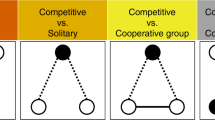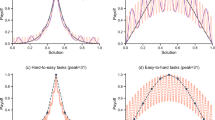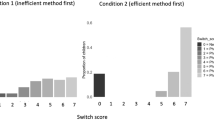Abstract
Replying to C. Andersson & D. Read Nature 511, 10.1038/nature13411 (2014)
In the accompanying Comment1, Andersson & Read challenge our results2 that group size influences cultural complexity. Using a dual-task computer game, our experiment demonstrated that an increasing group size prevents the loss of cultural traits (simple and complex), promotes their improvements and prevents cultural richness to disappear2. Among these various effects, Andersson & Read1 are questioning the finding that larger groups favour the persistence of the complex trait.
This is a preview of subscription content, access via your institution
Access options
Subscribe to this journal
Receive 51 print issues and online access
$199.00 per year
only $3.90 per issue
Buy this article
- Purchase on Springer Link
- Instant access to full article PDF
Prices may be subject to local taxes which are calculated during checkout

Similar content being viewed by others
References
Andersson, C. & Read, D. Group size and cultural complexity. Nature 511, http://dx.doi.org/10.1038/nature13411 (2014)
Derex, M., Beugin, M.-P., Godelle, B. & Raymond, M. Experimental evidence for the influence of group size on cultural complexity. Nature 503, 389–391 (2013)
Fisher, R. A. Statistical Methods for Research Workers (Oliver and Boyd, 1925)
Mesoudi, A. Variable cultural acquisition costs constrain cumulative cultural evolution. PLoS ONE 6, e18239 (2011)
Henrich, J. Demography and cultural evolution: how adaptive cultural processes can produce maladaptive losses—the Tasmanian case. Am. Antiq. 69, 197–214 (2004)
Shennan, S. Demography and cultural innovation: a model and its implications for the emergence of modern human culture. Camb. Archaeol. J. 11, 5–16 (2001)
Muthukrishna, M., Shulman, B. W., Vasilescu, V. & Henrich, J. Sociality influences cultural complexity. Proc. R. Soc. Lond. B 281, 20132511 (2014)
Kempe, M. & Mesoudi, A. An experimental demonstration of the effect of group size on cultural accumulation. Evol. Hum. Behav. http://dx.doi.org/10.1016/j.evolhumbehav.2014.02.009 (in the press)
Richerson, P. J. & Boyd, R. Not by Genes Alone (Univ. Chicago Press, 2005)
Mesoudi, A. Cultural Evolution: How Darwinian Theory Can Explain Human Culture and Synthesize the Social Sciences (Univ. Chicago Press, 2011)
Author information
Authors and Affiliations
Corresponding author
PowerPoint slides
Rights and permissions
About this article
Cite this article
Derex, M., Beugin, MP., Godelle, B. et al. Derex et al. reply. Nature 511, E2 (2014). https://doi.org/10.1038/nature13412
Published:
Issue Date:
DOI: https://doi.org/10.1038/nature13412
Comments
By submitting a comment you agree to abide by our Terms and Community Guidelines. If you find something abusive or that does not comply with our terms or guidelines please flag it as inappropriate.



